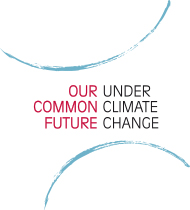The objective of this side event is to elaborate recommendations to be proposed at COP21 regarding Climate Smart Forestry. It will be organized as a Roundtable. Depending on the participants and their concerns, these recommendations will be adapted to temperate only or to temperate and tropical environments. Each participant will have to express his/her opinion and arguments about possible recommendations that will then be summarized and aggregated in a comprehensive list of statements.
Forests are able to mitigate climate change mainly through carbon sequestration, storage, and substitution. But these different options are generally conflicting. How should they be combined? This question is a first major challenge for forest management and policy. In parallel, forests are impacted by climate change through trends (beneficial or detrimental) and extreme events. They may adapt and deserve to be adapted to these gradual or brutal phenomena. Integration of trends and extreme events is a second major challenge for forestry. Adaptation and mitigation have to be distinguished because they are very different responses to climate change. In the same time, they are interrelated since mitigation supports carbon regulation as an ecosystem service influenced by forest adaptation. Moreover, each forest measure can be evaluated from both adaptation and mitigation viewpoints. Consequently, synergies and trade-offs between forest adaptation and mitigation are a third challenge. Finally, climate change issues are only a part of sustainable forest management and trade-offs also exist between climate change measures and sustainability at large. The situation is very challenging because today decisions need to take into account expectations about long-term intensity of climate change and atmospheric concentrations in greenhouse gases. In the same time, there are many uncertainties on the socioeconomic development (several scenarios), its effect on climate (several model results), the consequences on forest stands (resilience), the human ability to cope with them (adaptation capacity), long-term impacts of management activities.
In a field where one option is often promoted against all others, forest management should use all options in order to improve the forest carbon balance while preventing future risks, and to take into account short term aspects as well as long term considerations. The recommendations will thus present the main options that should be considered altogether during COP21 when dealing with forests.



